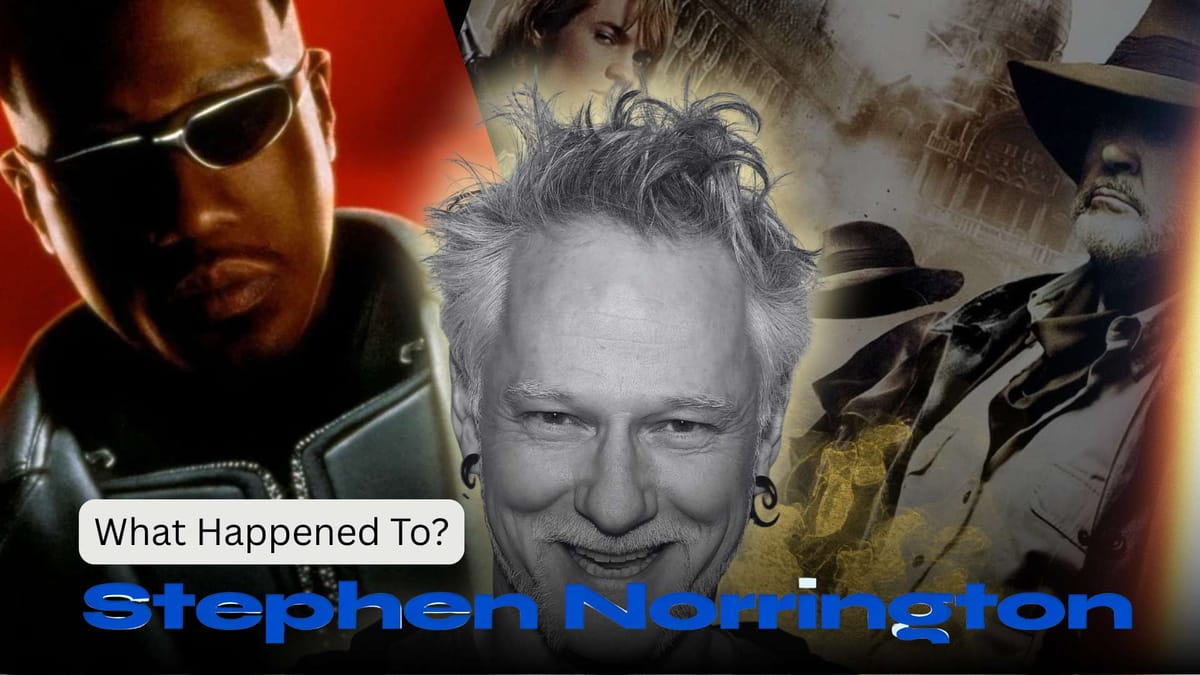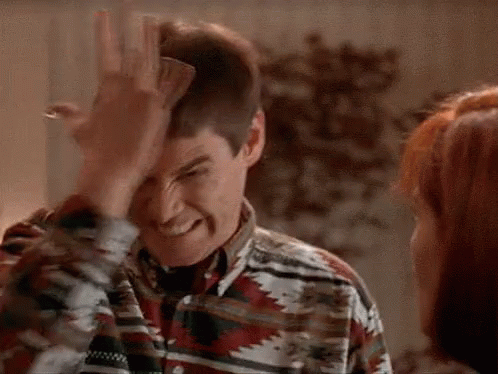Stephen Norrington directed Death Machine (1994), Blade (1998), The Last Minute (2001), and The League of Extraordinary Gentlemen (2003). He's currently working on The Migrant, a self-financed sci-fi feature he's shooting and creating effects entirely by himself.
"Hard question because I'm very full of myself," Norrington admits when asked about his filmmaking heroes. It's the kind of disarming honesty you don't often get from directors. He suspects his lifelong preoccupation with time running out might stem from intellectual giftedness. He hasn't watched a film in a cinema since 2015, owns no television or phone, and believes any human being can make a professional film entirely solo if they'd just stop making excuses.
After our conversation about his career, something struck me: we really have no clue about the real people behind the stories. Studio mythology, bad press, tabloid narratives - they all cloud the reality of who these filmmakers actually are. Norrington's emails were so unexpectedly open, humorous, and thoughtful that I found myself wanting to know more. Not just about The League of Extraordinary Gentlemen's troubled production or why he walked away from Hollywood, but about him - his philosophies, his influences, what makes him tick.

So I sent him a set of questions covering everything from John Carpenter worship to why rotoscoping is "frickin' Hell On Wheels," to some genuinely deep and heartfelt answers from Norrington. (and one big whoopsie daisy from me!)
Here's what he had to say - with the disclaimer that, as he puts it, his answers are "not remotely pithy."
Act I: The Ticking
When I asked what inspired the opening monologue of The Last Minute, Norrington's answer didn't reference a script or a single moment of inspiration. Instead, he described something that's been with him his entire life:
"My lifelong preoccupation is with time slipping away—it's always been painfully clear to me that 'The Clock Is Ticking' and 'It's Later Than You Think'—I look around and see people seemingly oblivious to their numbered days—that urgency has unrelentingly propelled me into situations and out of them, often useful but always exhausting—at age 61, I suspect it might stem from intellectual giftedness, a psychological trait that would explain my mindscape—but that's just a guess at this time."
Sixty-one years of watching the clock tick. Sixty-one years of seeing others waste their numbered days. That urgency explains why he walked away from studio offers after Blade, why he pushed through the Prague floods during LoEG, why he's now building The Migrant working solo in the forests of Oregon.
A decade at Burning Man crystallised this urgency into a single operating principle: "Radical self-reliance—take more responsibility for things so you can reduce your dependency on corporations that don't have your best interests at heart."
Not a slogan. A survival strategy. Because depending on corporations means surrendering control, and when you're racing against time you know is finite, control means everything.
So when I asked his advice for first-time filmmakers working with tiny budgets, what emerged was less advice and more autobiography:
"Do it yourself—literally everything, do it all—camera work, set building, lighting, sound, catering, costuming, editing—do it all—even some acting if there's a role for you and you're not horribly embarrassing—you're a human being, the most intelligent species that ever existed on Earth, perhaps in all the Universe—you can do it all—if those idiots over there can learn to use a DSLR so can you—if that clown can do Blender so can you—if these bozos can nail planks of wood together so can you—wtf? just get on with it—you can do it all—and then do it all again."
He's not theorising. He's the camera operator, the VFX artist, the set builder, the editor on The Migrant. Working solo (possibly one or 2 actors). No corporate subscriptions. No studio oversight. He's proving his own point in real time.
And when I asked about current film trends that frustrate him most, his answer revealed just how completely he's divorced himself from the mainstream film industry:
"I have no answer because I don't have a TV, I don't have a phone and I haven't been to the movies since 2015—I can say that I am frustrated by my old, bloated and lazy peers who are not making use of modern tools like digital cameras, Blender and actual cars to drive to actual locations and film actual things at no cost so they can personally comp awesome effects into their footage, practical or otherwise, no corporate subscriptions required."
Time is running out. It always has been. The only question is what you do with the days you have left.
Act II: The Toil
Norrington doesn't just talk about doing it all - he lives it. His respect for craft runs deep, rooted in decades of hands-on work with practical effects before he ever sat in a director's chair. These answers reveal someone still obsessed with the technical details, still frustrated by the tedious work, still chasing perfection.
What is the one non-negotiable rule you have for sound design in a great action or horror film?
It has to be awesome—which means picture, sound and music have to be built together as interlocking parts of a single whole—when Blade gets his shades back after decapitating Quinn, the picture/sound/music combo nails the moment for a seriously wicked action movie needle drop.
That Blade moment he's describing? It's a perfect synthesis. The image, the sound effect, the music cue - they don't just happen in sequence, they lock together as one unified beat. That's the standard. Built as one piece from the start.
If you could only use one type of visual effect for the rest of your career—practical puppets or CGI—which would you choose?
Oh come on, both!
Fair point. The question assumed an either/or choice that doesn't exist in actual filmmaking—especially not for someone who's been doing both since the 1980s. Of course he uses both. Why would anyone limit themselves? It's a bit like asking a chef "knife or heat?" The answer is always: whatever the dish requires.
As a director, what is the single most memorable trait or approach Brad Dourif brought to his performance on the set of Death Machine?
Er, the whole character?—I defined how he should look and I guess I wrote the script but pretty much all the weird and interesting things Brad did came from Brad—I was a gauche first timer—he was/is a powerhouse professional—I asked him once why he took on the Dante role—he replied in Dante's voice "the monneeey" and then delivered fully on our investment.
You have a background in practical effects. What is the single best pre-CGI visual effect you have ever seen in a movie? (For us, it might be the old man Jack Crabb makeup in Little Big Man).
Bottin's Norris-Thing in The Thing—no, wait, Bottin's Kennel-Thing—no, wait, Bottin's Darkness makeup in Legend—no, wait, for sure Bottin's Eddie Quist werewolf transformation in The Howling.
Watch what happens here: he can't choose. Every time he names one Bottin effect, he remembers another that's equally perfect. This isn't indecision—it's reverence. Rob Bottin—the legendary practical effects artist who defined 1980s creature work—represents the standard Norrington holds himself to: practical effects so good they transcend their era, so precisely executed that decades later they remain the benchmark. When Norrington talks about doing it all yourself, this is what he means—pursuing that level of craft, that commitment to getting it right.
If you could have one cinematic superpower (e.g., perpetual golden hour lighting, invisibility to studio execs), what would it be?
The power to instantly rotoscope an entire VFX sequence just by looking at it—as it stands now rotoscoping is frickin' Hell On Wheels.
Act III: The Truth
Every artist who passes through Hollywood emerges changed. Some are broken by it. Others learn its rules and play the game. Norrington did neither - he absorbed its lessons, recognised the system for what it was, and walked away. These answers may just reveal why.
Who is the one director you consider a true visionary genius—the person you most admire in cinema?
Er, hard question because I'm very full of myself—John Carpenter has influenced me the most—I guess you could call that admiration—frankly, it's just plagiarism.
You had a deal with James Cameron for Brother Termite. What's the best advice Cameron ever gave you?
No advice but he did tell me that, even after Titanic, he had to fight Fox for aspects of Avatar—that was surprising and very instructive—and he did kick me off the Aliens set in 1986 for talking back to him about some stupid thing he ordered me to do heh heh.
Think about what that Cameron revelation means: the most powerful, most successful director in Hollywood still fights studios. If even James Cameron can't escape corporate interference, what hope does anyone else have? For Norrington, this was the lesson that mattered. The studio system doesn't magically improve when you're successful—it just gives you bigger budgets to fight over.
What's the one movie set prop that you most regret not managing to smuggle out of a studio backlot?
Quatermain's excessively long rifle—if I'd have smuggled it from the Prague studio to the Malta location we'd have had it on set rather the bent rubber stunt prop with no hole in the barrel that was presented—thus the "punch me in the face" drama would never have unfolded.
Worth reading that answer twice.
If you could magically fix one flaw in The League of Extraordinary Gentlemen with a single day of reshoots, what would you add or change?
I'd magically not do reshoots, I'd magically do a total re-edit of the last three reels, restore the never-used material we shot and replace the entire score with something more inspired—then, after lunch, I'd magically resked [reschedule] the 2003 release to avoid Pirates of The Caribbean and magically bank the enlarged checks as I rolled back to Berkeley.
His solution isn't about fixing the film—it's about rewinding the entire process.
Which character from classic literature do you believe Hollywood has fundamentally failed to adapt correctly?
The entire League Of Extraordinary Gentlemen, Alan Moore stylee (for $10mil or less, of course).
What was the single most difficult practical challenge in filming the famous "Blood Rave" sequence in Blade?
Serious answer: wrangling the fake blood and all the extras, actors and crew who were soaked in it for a week—comedy answer: tuning out all the extras, actors and crew who were annoyed by being soaked in fake blood for a week.
The blood rave is arguably the most iconic sequence in Blade—the moment that announced this wasn't your average comic book film. But the reality was a hundred people covered in sticky plasma for seven consecutive days, growing increasingly miserable. An unforgettable opening built on a week of practical, unglamorous problem-solving and ignored complaints. That's filmmaking.
If Wesley Snipes' Blade were trapped in the world of The League of Extraordinary Gentlemen, which Victorian character would he absolutely refuse to team up with?
Mina Harker because she's a vampire—he would explode her head—or perhaps things would go meta and she'd explain that she was made a vampire (who turns into CG bats? wtf?) because Tom Rothman, chairman of Fox thought that would be cool—so Blade and Mina would team up and go out into the night looking for studio execs.
Even Norrington's hypotheticals turn into revenge fantasies against corporate interference. Mina wasn't a vampire in Alan Moore's original comic. So in Norrington's imagined crossover, the characters bond over their shared enemy: the executives who ruined their films. It's funny, but it's also revealing about where the real conflict was.
The Death Machine robot, the Reaper: what's one feature you wanted to include but couldn't afford in the 90s?
A name plate hung around the robot's neck that clarifies that its name is The Warbeast.
And there's my mistake, immortalised in print. I called the robot "the Reaper" when its name is actually The Warbeast. Norrington's answer is both a genuine response to the question and a gentle correction of my error. Consider myself burned, and deservedly so😂

What is the most underrated piece of sci-fi tech or vehicle from any movie that you wish you could have designed?
The Wachowskis' Speed Racer Mach 5.
If you had to pick one city to be the setting for your next major action sequence, which one would it be and why?
(The forests around) Bend, Oregon because that's where I'll be shooting it.
And then, the final question. The one that would reveal everything...
Idiocracy.
That was his answer when I asked which film best represents humanity if he could only show one to a future alien civilisation.
After everything—after Blade, after Prague floods and Sean Connery battles, after decades in the industry and a decade at Burning Man, after building his own films frame by frame—this is what he'd show the aliens.
It's the perfect answer. Not because it's cynical, but because it's consistent.
Idiocracy's premise is that society becomes so apathetic, so intellectually lazy, that civilisation decays over 500 years. From my point of view, Norrington sees Mike Judge's 500-year timeline as wildly optimistic. His frustration with "old, bloated and lazy peers" who won't pick up modern tools? That's the film's warning manifesting in real time. His obsession with people being "seemingly oblivious to their numbered days"? That's precisely the cultural apathy Judge satirised.
The choice also justifies everything. If humanity is best represented by a film about institutional decay and wilful laziness, then walking away from Hollywood studios wasn't retreat—it was self-preservation. The executives who interfered with LoEG, the system that wastes talent and time, the peers who make excuses instead of films—they're all characters in Judge's cautionary tale, just playing out their roles on a faster timeline than the film predicted.
So when Norrington works solo in Bend, Oregon building The Migrant entirely himself, he's not being a pessimist. He's being a realist. He's racing to create something meaningful before the clock runs out, whilst everyone else is too busy scrolling, complaining, or waiting for permission to start.
Is he right? Am I right?
Maybe that's not the question. The question is: what are you doing with your numbered days?
He's making The Migrant.



